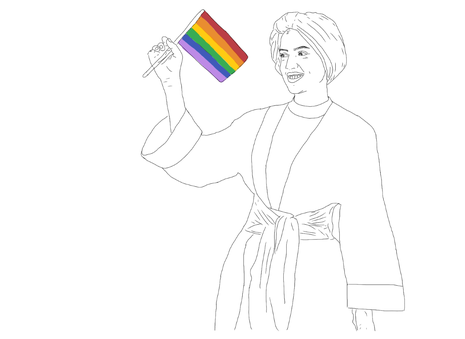

Experiencing rejection and discrimination as gay or bi women
People can be discriminated against on the basis of characteristics that are easily recognisable to others.
Such characteristics include, for example, sex, skin colour, facial deformities due to accidents or illness, or obesity.
But people can also be discriminated against on the basis of characteristics that other people only become aware of under certain conditions. Examples are religious affiliation, diseases and disabilities that are not immediately visible, HIV infections or sexual orientation. The term sexual orientation includes lesbian or bisexual women.
Lesbian means that women experience the sexual, romantic, physical and/or spiritual attraction to other women. Bisexual is a person who experiences sexual, romantic, physical and/or spiritual attraction to people of their own sex and to other sexes, not necessarily at the same time, in the same way or to the same extent.
Often these women experience rejection or even exclusion from today's society. When they are together with their (flesh-sex) partners, they often get dismissive looks or are even insulted, which can affect the psyche and well-being.
Further problems, which are much worse for many people affected, are the possible rejection of the family after a coming-out. If they live at home, they may have to leave it and find a new home. The family might not comprehend their sexual orientation and in extreme cases claim that they are ill. They do not receive any support or affection from the family and are virtually on their own.
In some cases the circle of friends also turns away from the person because they cannot accept their sexuality and no longer feel comfortable in the presence of the them.
Visits to the doctor, especially to the gynaecologist, can also lead to inconvenience and rejection. Some might experience a defensive attitude from the doctor and possibly do not not dare to be treated further by this doctor, thus avoiding the visit of the gynaecologist. In extreme cases, the doctor may refuse to treat or advise a lesbian or bisexual woman.
These are all extreme examples that apply only in part, sometimes less and sometimes more to those affected. But gay and bi women often have to deal with these barriers and rejections in everyday life.
For those affected, this often means an enormous psychological burden in everyday life. In order to support them and help them, there are a lot of organizations that provide advice and support to those affected with one or more of the problems mentioned. If such a case occurs, do not hesitate and contact these organizations. Some of these organizations are listed on this websiten on our resources and organisations pages.
If you feel addressed, do not hesitate to contact them.